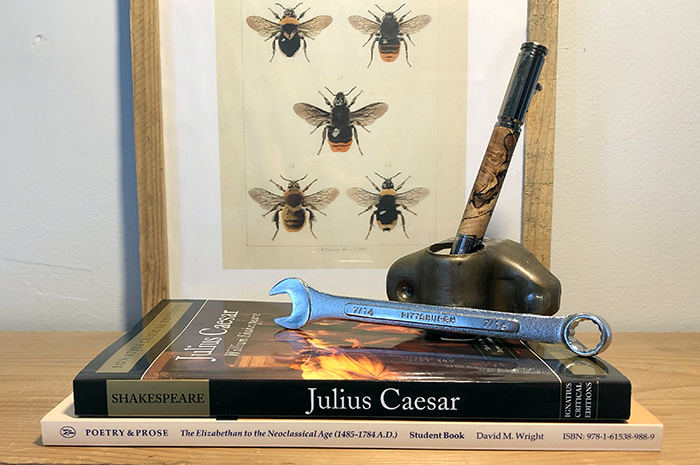
Like many teens, my 15 and 16 year olds’ future plans have changed yearly since 8th grade. Even more so for my oldest. Sometimes it looked like he would need a four-year degree, other times he said he would only need a one-year certificate. Still other times, it looked like he wouldn’t need to go to college at all.
But one thing has never changed: he wants to “work with his hands, not write essays.” His current plan is to own an automotive repair/restoration shop by the time he’s 25.
Now you might be saying, “Wait. A mechanic? I thought you were a classical homeschooler?”
I should probably stop here and explain our approach to college:
I loved every minute of my experience at a small liberal arts college. Financial obstacles kept me from returning, but my heart still stirs when someone mentions Aristotle!
My husband, on the other hand, did not love his college experience. Like our son, he wanted to learn by doing. He chose to enter the workforce at 19 and, despite many bumps along the way, he is a successful business owner who is able to provide for his family.
Our respect for college education, our understanding of those who are mechanically-inclined, and our experiences with employers and clients, have prompted us to take the following approach with our kids:
- college is not a requirement unless it’s necessary for fulfilling God’s call on their life
- a degree may be prudent since most employers now require one, regardless of what the degree is in
- if they don’t know what their calling is, a liberal arts degree will give them the most options, the piece of paper employers want to see, and be a worthwhile investment in their continued formation as human persons
- the final decision is between them and God
So while our sons discerned their path, we continued with a classical education.
If they decided to go to a liberal arts school, they would be ready.
If they decided to go into a specialized field, they would only need some additional science and math courses.
If they decided against college, they would still enter adult life as well-formed persons.
For college entrance exams, we planned on them taking the CLT in place of the SAT; unless, of course, their chosen school only accepts the SAT.
The above approach was recently put to the test.
This past week, I realized it was time to register both boys for their preliminary college tests.
My 15 year old is headed for a liberal arts degree, so I knew he needed the CLT10 as planned. My 16 year old’s choices were up in the air, however, so we sat down to figure out what he needed.
We looked at our local tech/community college last spring, but they would require general education courses in addition to his automotive work. Like I said, he wants to work, not write essays, so he decided against the local school.
I really wanted him to go to Harmel Academy in Grand Rapids, Michigan (you HAVE to check out this school!). But then he spoke with the school’s founder who said the current program isn’t a direct fit for what my son wants to do.
We then looked at some other tech schools, but they’re far away with no on-campus housing and/or poor reviews.
Not sure where to head, I took another look at our local school and realized we had misread their information!
As it turns out, the only general education courses required for an automotive certificate are a technology orientation class, an automotive-related math class, and a course on workplace communication.
On top of that, he would not need any college entrance exams other than the Accuplacer — which this particular school requires of all homeschooled students.
He’s sold.
The one year course will give him a certificate in Automotive Service Technology. He then plans to earn a second certificate in Diesel Heavy Truck Technology (from the same school) and sit for the ASE industry exam.
In the meantime, he’s going to be looking for paid apprentice work at one of the local shops. If he decides that the shop atmosphere is not for him, then he will most likely attend Harmel. They do include humanities, but the courses are primarily reading/discussion and the topics bear directly on the tradesman’s vocation. But again, he will not need college entrance exams.
If he was less decisive about his path, I would still require the CLT to keep his options open; but I’m fairly confident now that he can move forward without it.
So am I adjusting his remaining courses since he won’t “need” things like Material Logic or Dante’s Divine Comedy?
Nope.
…students will develop their understanding of Human Dignity, the Primacy of Jesus Christ over all things and how to achieve Peace at Work taking a deep look at how these elements effect four areas of life: The Self, The Other, The Family & The World.
HARMEL ACADEMY OF THE TRADES
And that’s exactly what we’re giving our sons through a classical high school education.
The only catch is that I have to figure out his remaining courses! He only needs two more electives in his plan, but they’re eluding me at the moment.
Who would have thought that planning electives would be the tough part?



Leave a Reply